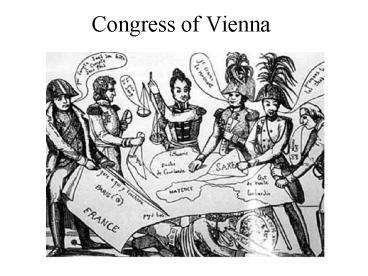Congress of Vienna - PowerPoint PPT Presentation
1 / 24
Title: Congress of Vienna
1
Congress of Vienna
2
The Congress of Vienna(September 1, 1814 June
9, 1815)
3
Coin Commemorating the Opening of the Congress of
Vienna
4
Main Objectives
- Its job was to undo everything that Napoléon had
done - Reduce France to its old boundaries ? her
frontiers were pushed back to 1790 level. - Restore as many of the old monarchies as possible
that had lost their thrones during the Napoléonic
era. - Supported the resolution There is always an
alternative to conflict.
5
- Goal 1 Containment of France
- Prevent French aggression by surrounding the
country with strong countries. - Created the Kingdom of the Netherlands
- Combined 39 German states into the German
Confederation (dominated by Austria) - Switzerland now independent nation
- Kingdom of Sardinia (in Italy) adds Genoa
6
The Germanic Confederation, 1815
7
- Goal 2 - Balance of Power
- Did not severely punish France might try to
seek revenge - Do not break up the country that could lead to
another country becoming too strong - France is a major, but weakened European nation.
- No Country Could Easily Overpower Another
8
Goal 3 Legitimate Governments Return the
monarchs to power in the countries in which
Napoleon drove them out. The members of the
Congress believed this would stabilize political
relations among nations
9
Compensation and Legitimacy
- Compensation
- Napoleons enemies rewarded with land
- Other nations compensated for land taken
- Redrew the map of Europe
- Legitimacy
- Restoration of pre-Napoleon rulers
- House of Bourbon France, Spain, and the two
Sicilies - House of Braganza Portugal
- House of Orange Netherlands
- House of Savoy Sardinia
- German princes territories in the Confederation
of the Rhine - Pope and Catholic Church Papal States
10
Key Players at Vienna
- Foreign Minister, Viscount Castlereagh (Br.)
Tsar Alexander I (Rus.)
The HostPrince Klemens von Metternich (Aus.)
King Frederick William III (Prus.)
Foreign Minister, Charles Maurice de Tallyrand
(Fr.)
11
Metternich
- The first and greatest concern for the immense
majority of every nation is the stability of laws
never their change.
12
Of course, there were hundreds of other minor
princes, dukes, barons, and religious leaders all
meeting in Vienna. They went to party after
party. During the night they danced with great
beautiesbut during the day, they negotiated for
their separate countries.
13
(No Transcript)
14
(No Transcript)
15
Key Principles Established at Vienna
- Balance of Power
- Legitimacy
- Compensation
- Coalition forces would occupy France for 3-5
years. - France would have to pay an indemnity of
700,000,000 francs.
16
Territorial Changes
- Austria gained Lombardy, Modena, Parma, Tuscany,
and Venetia (all are areas in Italy) - England gained Cape Colony, Ceylon, Heligoland,
Guiana, and Malta (areas in Africa, the Americas,
and Asia) - Holland gained Austrian Netherlands (Belgium)
- Prussia gained part of Poland, land along the
Rhine River, 40 of Saxony, Swedish Pomerania,
and Westphalia - Russia gained Finland and part of Poland
- Sweden gained Norway
17
Changes Made at Vienna (2)
- Norway and Sweden were joined.
- The neutrality of Switzerland was guaranteed.
- Hanover was enlarged, and made a kingdom.
- Britain was given Cape Colony, South Africa, and
various other colonies in Africa and Asia. - Sardinia was given Piedmont, Nice, Savoy, and
Genoa. - The Bourbon Ferdinand I was restored in the Two
Sicilies. - The Duchy of Parma was given to Marie Louise.
- The slave trade was condemned (at British
urging). - Freedom of navigation was guaranteed for many
rivers.
18
Frances borders were reduced to those of
pre-revolutionary France (1789)
19
Fate of Nationalism
- People had no say over territorial changes
- Language, nationality, and religion werent taken
into consideration - Ideas of democracy and self-government were
rejected by European leadership
20
Italy remained a mix of Kingdoms, Republics and
the Papal States.
21
Louis XVIII of France
- No more divine right of kings
- Charter (Constitution) granted in 1814
- Could not restore feudalism and serfdom
- Continuing religious toleration guaranteed
22
Quadruple and Holy Alliances
- Metternich desired to maintain the status quo and
make the Vienna treaties permanent - Quadruple Alliance of 1815
- Austria, England, Prussia, and Russia
- France joined in 1818
- Pledged to put down democratic or nationalistic
revolts - Holy Alliance
- Organized by Tsar Alexander I of Russia
- Most European monarchs joined
- Pledged to govern with charity, justice, and
peace - But none of them did so
23
Results of the Congress of Vienna
- Concert of Europe group of leading nations
which periodically met to discuss issues
regarding stability - Temporary suppression of democratic and
nationalistic ideals - International peace no general war in Europe
until World War I a hundred years later - Crimean War (1854-1856)
- Austro-Prussian War (1866)
- Franco-Prussian War (1870-1871)
24
Europe After the Congress of Vienna































